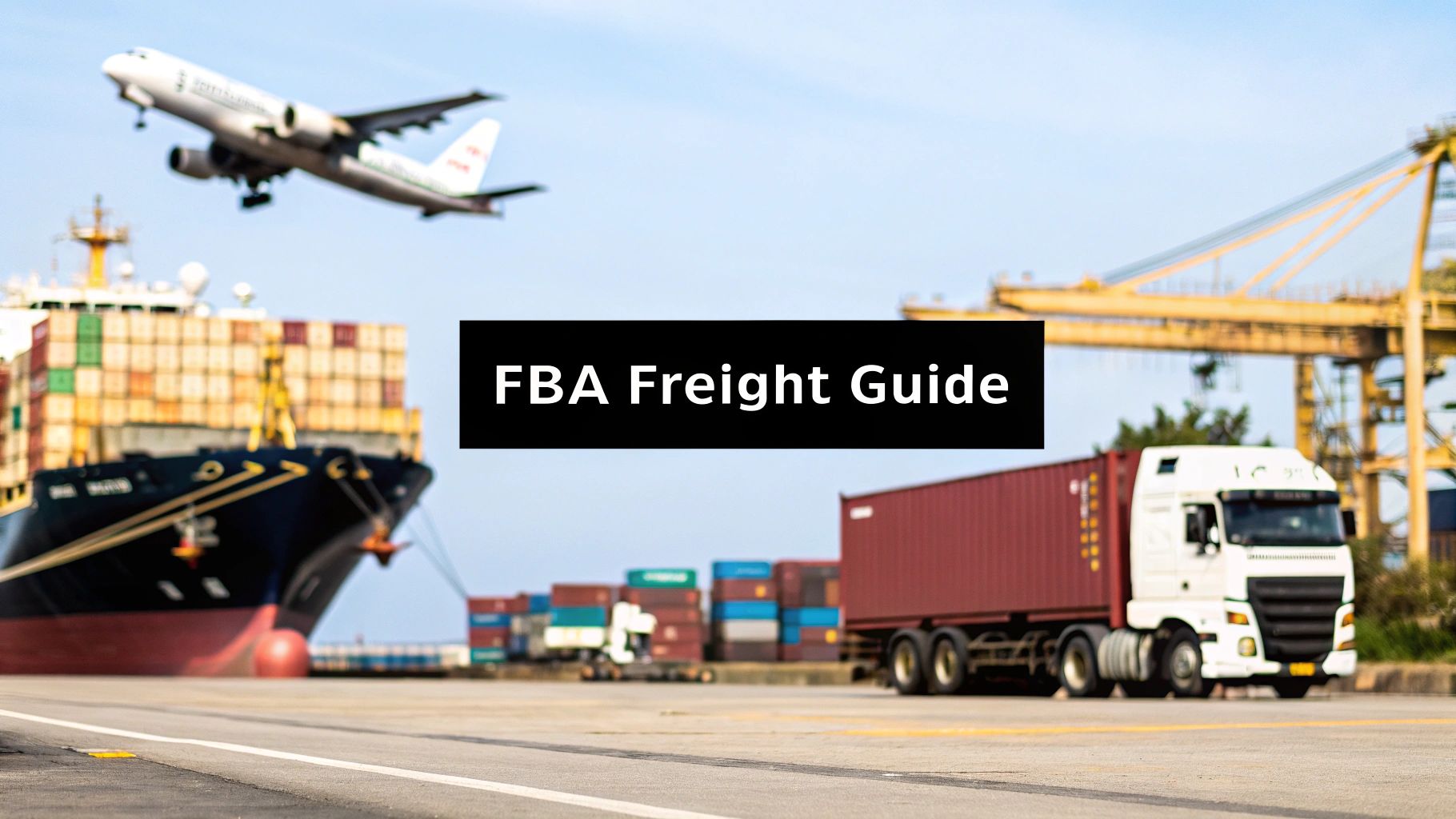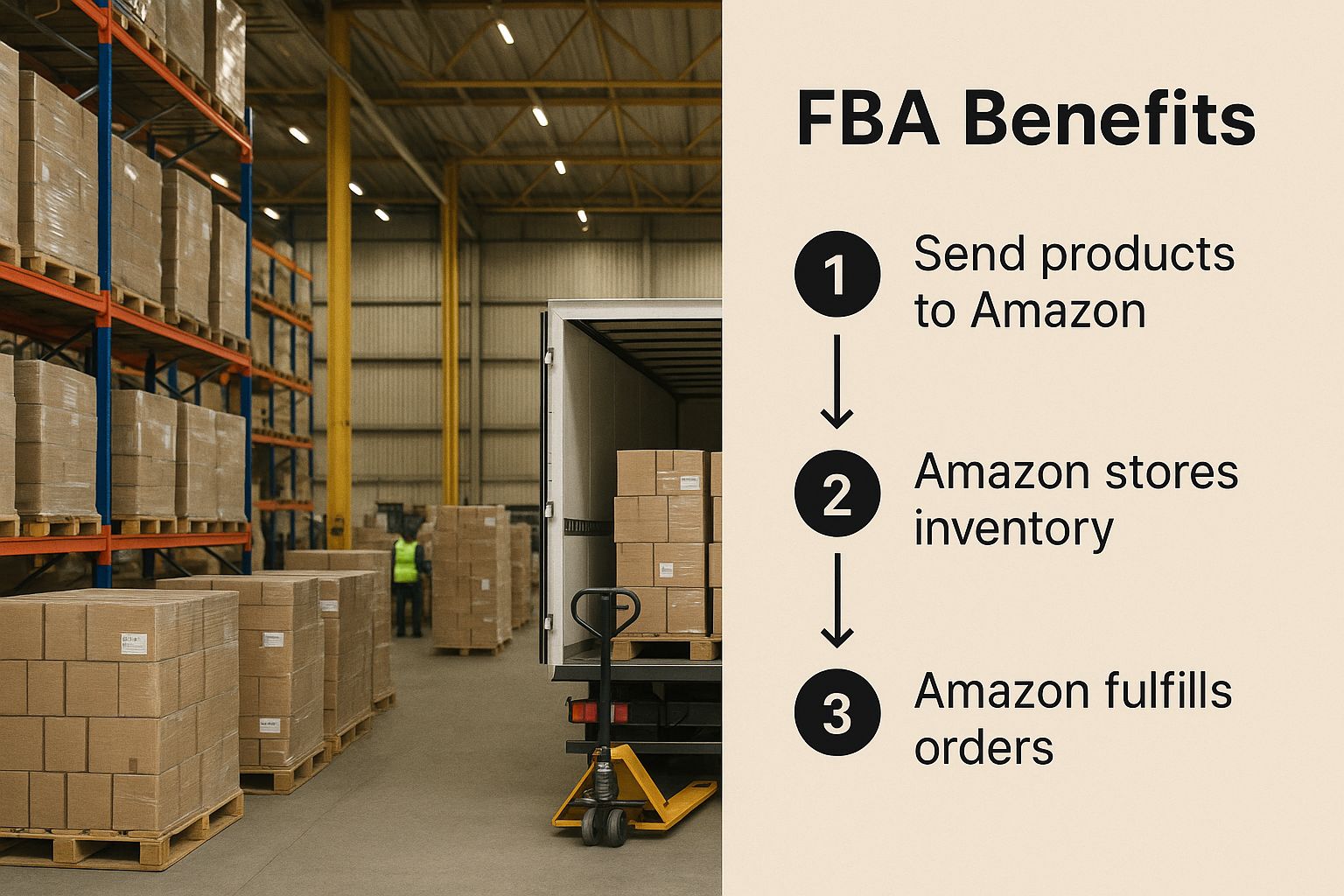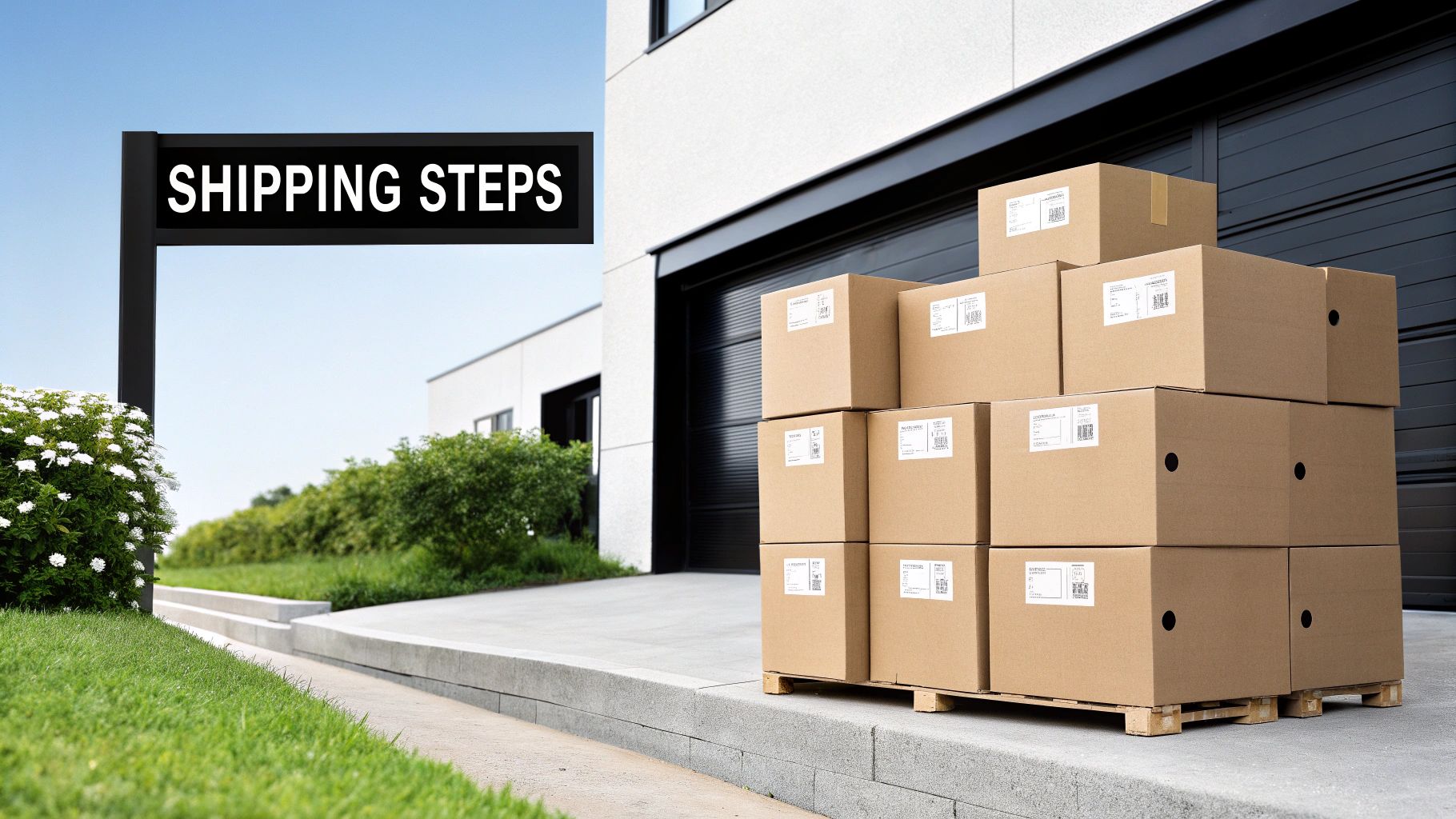Stay Updated with Everything about MDS
Thank you! Your submission has been received!
Oops! Something went wrong while submitting the form.

Chilat Doina
September 17, 2025
Think of a freight forwarder as the ultimate travel agent for your products. If you're sourcing goods from overseas for your Amazon FBA business, they're the partner who handles the complicated journey from your manufacturer's doorstep all the way to an Amazon fulfillment center. They're the pros who manage the logistics, paperwork, and regulations you don't have time for, making sure your inventory gets where it needs to go, safe and sound.
Trying to ship products directly from a factory in China to an Amazon warehouse is a bit like planning a multi-country trip with connecting flights, visa rules, and ground transport in a language you don't speak—all by yourself. Sure, you might be able to book the main flight, but you'll get bogged down fast when it comes to customs, local carriers, and all the unexpected red tape. It’s a classic recipe for expensive mistakes and infuriating delays.
This is exactly where freight forwarders for Amazon FBA become indispensable.
Amazon has very strict rules for inbound shipments, and they make one thing crystal clear: they will not act as the Importer of Record (IOR). That means they won’t touch customs clearance or pay duties for you. On the other end, your manufacturer in Asia isn't set up to navigate U.S. customs, either. This leaves a massive gap in the process, and a freight forwarder is purpose-built to fill it.
A freight forwarder does a lot more than just move boxes from Point A to Point B. They're the conductors of a complex supply chain symphony, making sure your goods flow seamlessly from origin to destination. For an FBA seller, this is everything—it's how you keep your products in stock and your sales rolling.
Here’s what they really bring to the table:
It's easy to think of a freight forwarder as just another expense. The reality? A good one saves you a ton of money by preventing costly errors, customs fines, and the massive opportunity cost of stocking out because of a shipping delay. They're a foundational investment for any serious FBA business.
A successful product launch on Amazon often comes down to getting the logistics right. You can see how critical streamlined shipping is in the operational success of launching products like Purezenjoy through Full Circle Agency, where getting inventory in place is a make-or-break part of the strategy.
Ultimately, teaming up with the right freight forwarder isn’t just about convenience. It’s a strategic move that protects your investment and sets your business up for sustainable growth.
Wondering what actually happens to your products after they leave the factory? It can feel like a total black box. To pull back the curtain, let's trace the path of a hypothetical shipment—say, 1,000 units—from a manufacturer in Shenzhen, China, all the way to an Amazon FBA warehouse in Dallas, Texas. Think of this as a roadmap for your inventory's long international voyage.
This handy visual breaks down how all the moving parts of the FBA shipping process come together, making sure your products land ready to sell.

As you can see, a smooth trip is all about a series of perfectly timed handoffs, and your freight forwarding partner is the one conducting the orchestra.
It all starts the second your production run finishes. Your freight forwarder dispatches a truck to grab the cartons right from your supplier's doorstep. This isn't just a simple pickup, though. The forwarder immediately gets to work making sure the cargo is properly documented for export.
They handle the first crucial pieces of paperwork, like the Commercial Invoice and Packing List, which spell out exactly what's being shipped and what it's worth. Get this wrong, and you're setting yourself up for major headaches down the line.
Before your goods can even think about leaving China, they have to clear export customs. Your freight forwarder is your boots on the ground, submitting all the required documents to Chinese officials. They're there to confirm your products are legal to export and that every detail is spot on.
This step is usually pretty straightforward, but it's a non-negotiable legal hurdle. A forwarder with a solid local team can breeze through this, keeping your shipment from getting stuck in red tape before the real journey even begins.
Once you have the green light from customs, your shipment is off to the port or airport. This is where your forwarder books its ticket on a container ship (for ocean freight) or a cargo plane (for air freight). If you're shipping Less than Container Load (LCL), your boxes will be consolidated with other sellers' products to fill up a single container.
This is the longest leg of the trip. Ocean freight from China to the U.S. West Coast usually takes about 14-20 days on the water. Air freight is much quicker, typically just 3-7 days. The right choice really comes down to your budget and how fast you need to restock.
When the ship or plane finally arrives at a U.S. port like Los Angeles, your shipment isn't quite home free. It has to be unloaded from the vessel, a process that can take a few days, especially if the port is backed up. Your forwarder manages this entire stage, coordinating with the port authorities and terminal operators.
They'll pay any terminal handling fees and get your container moved to a holding area while it waits for the next big step: U.S. customs.
This is arguably the most critical—and nerve-wracking—part of the whole process. Working with a licensed customs broker, your forwarder submits an Importer Security Filing (ISF) and a formal customs entry to U.S. Customs and Border Protection (CBP).
This is where they officially declare what's in your shipment, its value, and calculate the import duties and taxes you owe.
CBP can flag any shipment for a random inspection, which can add days or even weeks to your timeline. A seasoned FBA freight forwarder is your best defense against this, ensuring every piece of paperwork is flawless from the start.
Once CBP gives the all-clear and your duties are paid, your shipment is officially released into the United States.
You're in the home stretch! The final leg is moving your products from the port to the specific Amazon FBA fulfillment center they're assigned to. Your forwarder arranges for a truck to pick up your freshly cleared cargo.
But wait—before it heads to Amazon, it might make a pit stop at a prep center. These specialists make sure your products are 100% compliant with Amazon's strict rules, from slapping on FNSKU labels to palletizing cartons just right. To learn more about how this works, you can dive deeper into the role of dedicated Amazon prep centers.
Finally, your forwarder books a delivery appointment with Amazon and gets your perfectly prepped inventory to the FBA warehouse, officially completing its epic journey.

Picking your logistics partner is one of the biggest decisions you'll make for your FBA business. Seriously. Think of it like choosing a co-pilot for your supply chain—the right one will guide you smoothly through turbulence, while the wrong one can send you completely off course. This goes way beyond just finding the cheapest quote.
Your goal is to find a partner who feels like a genuine extension of your team. You need someone who gets the unique, and often frustrating, demands of shipping into Amazon's world. With the right freight forwarders for Amazon FBA, you build a resilient supply chain that fuels your growth instead of holding it back.
Not all freight forwarders are created equal, especially when Amazon is the final destination. A company that’s a pro at shipping heavy machinery might be totally lost when faced with FBA's strict pallet requirements and finicky appointment scheduling. You need a specialist.
When you're looking at potential partners, focus on these non-negotiables:
The freight forwarding world is split between massive global players and smaller, specialized firms. Each has its pros and cons, and the right choice really depends on your business size and what you value most.
Choosing between a giant corporation and a focused specialist can dramatically change your experience. Here’s a quick breakdown to help you see the difference.
A large forwarder might dangle a slightly lower rate, but a specialized FBA forwarder can save you thousands by preventing a single rejected shipment at an Amazon warehouse. The real value is often in their expertise, not just the initial quote.
The ecosystem supporting FBA is massive. By 2025, the program is projected to support over 600,000 active sellers globally, with a staggering 82% of all Amazon sellers using it to grow their business. This incredible scale shows just how vital expert logistics partners are for navigating the supply chain that keeps this engine running.
Before you sign on the dotted line, get them on the phone and come prepared with some pointed questions. Their answers will tell you everything you need to know about their real-world expertise.
Choosing your logistics partner is a strategic move that directly impacts your inventory health, customer satisfaction, and your bottom line. While plenty of companies can move a box from A to B, only a true expert can be the kind of 3PL partner that helps your Amazon business thrive. You can learn more by exploring our in-depth guide to 3PL logistics for Amazon to see how these partnerships work on a deeper level.
For an Amazon FBA seller, stocking out is more than just a minor hiccup. It's a direct hit to your sales velocity, Best Seller Rank, and, ultimately, your bottom line. Just one unexpected delay can kill all the momentum you’ve built. The hard truth about global logistics is that delays are a matter of when, not if.
Events happening halfway across the world, like a congested port or a surprise holiday rush, can bring your entire supply chain to a dead stop. This is where a solid, proactive partnership with your freight forwarder becomes your best defense against stock-outs and lost sales.
The data doesn't lie. Shipping delays are a massive headache for sellers, with shipping times jumping by 37% compared to before the pandemic. FBA shipments are now taking an average of 23 extra days to arrive, thanks to clogged ports and other global hiccups. The top sellers know that the secret to thriving is building a logistics system that can take these hits and keep on moving.
A resilient supply chain isn't something you stumble into; it's designed with intention. It means shifting from a reactive mindset ("Where the heck is my shipment?") to a strategic one ("How do we get ahead of the next problem?"). Your freight forwarder is your lead architect in this.
Work with them to map out a shipping calendar that anticipates the usual bottlenecks, like Chinese New Year or the Q4 holiday madness. A seasoned forwarder can also point you toward less-congested shipping lanes or ports. It might add a few days of transit time on paper, but it can save you weeks of sitting idle at a major gridlocked hub.
A huge part of this strategy is building in buffer inventory. This is your safety net. It means holding extra stock, either at a 3PL warehouse or simply by ordering from your supplier earlier than you think you need to. For FBA sellers, knowing how to handle these disruptions is everything. You can learn more about creating a more robust plan by Mastering Supply Chain Risk Management.
When a real crisis hits—a customs hold, a port strike, a freak weather event—a good forwarder switches gears from logistics coordinator to full-on problem-solver. They become your eyes and ears on the ground, feeding you critical updates and rolling out contingency plans.
Think of your freight forwarder as your supply chain's first responder. While you're asleep, they might be on the phone with a port agent in another time zone, actively working to reroute your container or clear a documentation issue before it becomes a multi-week disaster.
Here’s how a great forwarder manages risk when things go sideways:
At the end of the day, managing these risks is what building a scalable brand is all about. A strong partnership with your freight forwarder is the foundation of a healthy e-commerce supply chain, turning potential chaos into bumps in the road you already planned for. This approach swaps anxiety for an actionable plan.
Getting a freight forwarding invoice can feel like trying to decipher a secret code. It's often a long scroll of line items, confusing acronyms, and charges that make even experienced sellers' heads spin. But getting a handle on these costs is non-negotiable if you want to budget properly and protect your profit margins.
Think of your total shipping cost not as one giant fee, but as a bundle of smaller ones. Each charge represents a specific task or service that happened along your product's journey. Your forwarder pays these out on your behalf and then rolls them all into your final bill. A good, transparent quote will break it all down so you know exactly where every dollar is going.
While no two shipments are identical, most invoices from freight forwarders for Amazon FBA share a few common, heavyweight charges. Once you get familiar with these, the rest of the bill starts to make a lot more sense.
Here are the usual suspects you’ll see on almost every invoice:
Nailing down your cost structure is more critical than ever. As of 2025, a whopping 82% of Amazon sellers are using FBA. With Amazon's own fulfillment fees jumping by roughly 7% last year, every penny you save on inbound shipping goes straight to your bottom line. You can dig deeper into how FBA seller costs are evolving at Forceget.
The first quote you get is rarely the final number you pay. A bunch of different variables can make that price swing up or down, sometimes by a lot. Understanding these moving parts helps you plan shipments more strategically and keep costs in check.
The main things that will move the needle on your final bill are:
The nightmare scenario for any FBA seller is getting hit with a surprise bill long after you thought everything was paid. Good forwarders pride themselves on transparency, but it always pays to be vigilant. Keep an eye out for vague line items like "admin fee" or "documentation fee" that don't come with a clear explanation.
Your best defense is to always ask for an all-inclusive or "door-to-door" quote that itemizes every expected cost. Before you sign anything, ask your potential forwarder point-blank: "Are there any other charges I should expect that aren't listed here?" A trustworthy partner will give you a straight answer, letting you budget with confidence and avoid those nasty last-minute surprises.

It’s easy to see your freight forwarder as just another vendor you pay to move boxes from Point A to Point B. But thinking that way is a huge missed opportunity. The smartest Amazon FBA sellers know their forwarder is a strategic partner—a true extension of their team.
When you shift from a purely transactional mindset to building a genuine partnership, everything changes. Suddenly, you get better service, smoother operations, and a supply chain that can actually handle the unexpected. Your forwarder starts to understand your business goals, and they begin offering proactive solutions you never would have thought of on your own. It all starts with communication and trust.
You know what causes the most expensive, hair-pulling mistakes in shipping? Simple miscommunications. Seriously. The single best thing you can do for a smooth shipment is to give your forwarder clear, accurate, and timely information right from the start. That means handing over all the necessary documents and being completely transparent about your products and deadlines.
In return, a great partner won't leave you in the dark. They’ll give you proactive updates, keep you in the loop on your shipment's progress, and flag potential issues before they spiral into full-blown crises. Don't ever hesitate to ask them questions—lean on their expertise.
Here’s how to make communication work:
A strong partnership with your freight forwarder is built on more than just emails and phone calls. It's about treating them as the logistics experts they are and using their knowledge to make smarter business decisions.
A top-tier forwarder knows so much more than just container ships and customs forms. These people have a bird's-eye view of global trade flows, seasonal demand shifts, and all the logistical headaches bubbling up around the world. Their brain is an incredible resource for your FBA business, if you know how to tap into it.
Don't just call them to book a shipment. Treat them like a consultant. Ask for their take on navigating new trade policies or how to best plan your inventory for the crazy Q4 holiday rush. An experienced forwarder can give you priceless advice on how to tweak your shipping schedule to avoid peak season surcharges or suggest alternate routes to get around congested ports.
By building this kind of collaborative relationship, you turn your freight forwarder from a simple service provider into a key ally. This partnership becomes your secret weapon, helping your Amazon FBA business navigate the wild world of global trade with more confidence and a whole lot less stress.
Diving into the world of global logistics can feel like learning a new language, especially when you're dealing with Amazon FBA. Getting straight answers is the first step to building a supply chain you can actually rely on. Let's tackle some of the most common questions we see from sellers just like you.
This one trips a lot of people up, but the roles are actually pretty distinct—though they work hand-in-hand. Think of your freight forwarder as the general contractor for your entire shipment. They're the ones organizing the whole show: booking the space on the ship or plane, coordinating the pickup from the factory, and managing all the moving pieces to get your goods from Point A to Point B.
A customs broker, on the other hand, is a specialist. They have a much tighter focus. These are licensed pros who handle the very specific, very legal process of getting your goods cleared through customs. In almost every case, your freight forwarder will either have a customs broker on their team or work directly with one to make sure your shipment is declared correctly and all the duties and taxes are paid.
It's tempting, I know. Many suppliers offer to handle the shipping for you, usually through a local forwarder they have a relationship with. While it sounds easy, this is a risky shortcut for any serious FBA seller. Your supplier's main goal is just to get the products out of their warehouse; they aren't experts in Amazon’s notoriously strict receiving requirements or the nuances of U.S. customs.
Using your own FBA-savvy freight forwarder gives you control and visibility. It ensures your shipment is compliant with Amazon's rules from the start, preventing costly rejections at the fulfillment center door that your supplier’s shipper would never anticipate.
The golden rule here is simple: book as early as you possibly can. If you're shipping by sea, you should be locking in your booking at least three to four weeks before your cargo is actually ready to leave the factory. During the busy peak season (think August through October), you might need to book even earlier than that.
Giving your forwarder this much lead time allows them to find space on a vessel at a decent rate. It helps you dodge those painful last-minute price spikes or, even worse, getting your container "rolled" to a later sailing. Air freight is a bit more forgiving and usually only needs about a week's notice.
This is a big one. Ultimately, who's on the hook for damage depends on two things: your shipping terms (you'll see these referred to as Incoterms) and whether or not you have cargo insurance. Generally, once the forwarder has your goods, the liability shifts at different points along the journey. But here's the catch: without insurance, trying to get reimbursed for damages is a nightmare and is legally capped at a ridiculously low amount per kilogram.
That's why purchasing cargo insurance is non-negotiable. It’s a small price to pay to protect your inventory—your biggest asset—against loss or damage while it’s on the move. Your freight forwarder can add it to your shipment with no fuss, giving you some much-needed peace of mind.
At Million Dollar Sellers, we know that mastering logistics is a game-changer for scaling your brand. Our exclusive community connects you with 8- and 9-figure founders who have perfected their supply chains and share their strategies openly. If you’re ready to learn from the best in the business, find out more about joining us at Million Dollar Sellers.
Join the Ecom Entrepreneur Community for Vetted 7-9 Figure Ecommerce Founders
Learn MoreYou may also like:
Learn more about our special events!
Check Events